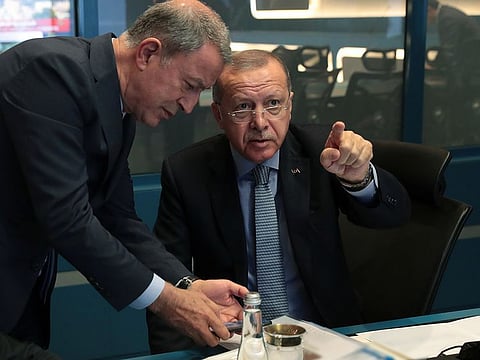Turkish ambitions in Libya worrying for the region
Backing Al Farraj is part of Ankara’s designs to exploit vast opportunities in Libya

Turkey certainly has major plans for Libya. Reconstruction projects and oil mainly drive Ankara’s ambitions, as it strives to gain a foothold in the oil-rich Arab country.
So it comes as no surprise when President Recep Tayyip Erdogan threw Turkey’s support behind the Government of National Accord, led by Fayez Al Sarraj.
Ankara clearly has its sights set on the $18 billion (Dh66 billion) reconstruction projects in Libya. A lion’s share of the projects would come Turkey’s way if Al Sarraj’s forces gain the upper hand in the war-torn country.
A firmer footing in Libya will make it easier for Turkey to demarcate maritime borders and expand its exclusive economic zones.
That, in turn, will strengthen Turkish chances of gaining control of supply routes in the Eastern Mediterranean.
Mediterranean countries see the move as Turkey’s attempt to press for a share in the maritime resources of the eastern Mediterranean, even at the coast of encroaching into other countries’ territoriesMohammad Hassan Al Harbi
Against this backdrop, it is imperative to examine Turkey’s attitudes towards the Arab world, particularly Libya.
We should remember that Ankara’s aspirations are no longer mere intentions; they have become a ground reality.
It is reinforced by recent Turkish actions, particularly the decision to send more than 1,000 troops, with military vehicles and equipment, including drones, to Libya last week.
But the bulk of these troops are not soldiers. They are terrorists who fought in Syria.
Fight against terrorism
Then the question is: Does international law permit the transfer of terrorists from one country to another with the aim of occupying it or interfering in the ongoing internal conflict? Unlikely. Or else, how can the fight against terrorism be legitimate?
The recent agreement on maritime boundaries signed by Erdogan and the Al Sarraj government will allow the expansion of Turkey’s continental shelf in the Eastern Mediterranean.
Mediterranean countries see the move as Turkey’s attempt to press for a share in the maritime resources of the eastern Mediterranean, even at the coast of encroaching into other countries’ territories.
It also is evidence of Ankara’s greed to grab a big chunk of Libya’s huge energy resources and to benefit from its important geopolitical position.
The deal also explains Turkey’s eagerness and hectic attempts to save the government of Al Sarraj and its pro- militias in Tripoli, since the Libyan National Army led by General Khalifa Haftar has made much progress in its march towards the capital Tripoli.
Natural gas discoveries
The rush for oil and gas reserves in the Eastern Mediterranean follows massive natural gas discoveries in the basin. A huge natural gasfield called “Leviathan” with estimated initial reserves of 23 trillion cubic feet has been discovered in a 180-sqkm stretch from the shores of Latakia in Syria to north Damietta in Egypt, according to the Berlin-based Ferrell Centre for Studies.
Which countries have the right to prospect for oil and gas within in these waters?
The share of Syria, Lebanon and Egypt is greater than Israel’s.
There are no oil and gas deposits in Turkey’s territorial waters, which is why Turkey is eager to claim a stake in the Mediterranean energy treasure.
The international rejection of Turkish attempts to interfere in Libya was swift and vehement, with several countries and entities expressing alarm at the Turkish president’s plans to deploy troops in the conflict-torn country. The Arab League and European Union, the UAE, Saudi Arabia and Russia, expressed their displeasure.
Some European newspapers said Turkey’s military actions are also a message to Europe, which has suffered from the flow of Arab and African refugees through the Turkish border.
Turkish games
Adopting a blatant policy of blackmail, Ankara is said to have collected about €5 billion (Dh20 billion) for closing its borders and preventing refugees from entering Europe.
Having tasted success, Turkey wants to play this game again.
A Turkish presence would allow African migrants to flow into Libya in large numbers and cross the sea to Europe.
Turkey is also adding fuel to the fires by trying to turn the internal strife in Libya into a struggle over Libya, as is the case in some Arab countries.
No one wants the conflict to continue and the calls for a ceasefire are bound to have backers in both sides. The ceasefire must lead to a constructive dialogue under the auspices of the international community.
A viable ceasefire will take hold only if foreign forces withdraw from Libya. Turkey must pull out its troops and Tripoli militias must hand over their weapons to the Libyan National Army. These conditions are necessary to prevent Libya from sliding towards a Lebanese scenario, where they would end up having a state within a state.
It’s important to put out the flames of conflict. Or else, there’s a risk of spreading to other countries in the region.
— Mohammad Hassan Al Harbi is a renowned columnist and author whose writings cover various fields ranging from media studies to education.



